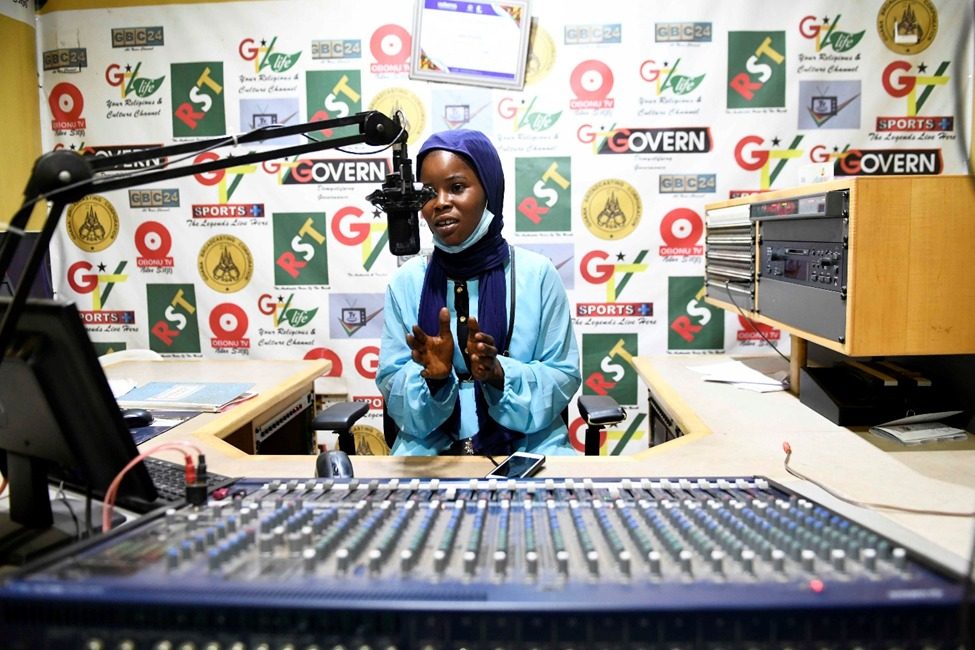The radio show giving unmarried mothers a voice in Ghana
Nimaatu broadcasts in her local dialect with the aim of reaching as many people as possible, promoting the better treatment of unmarried mothers, and ending the shame and stigma surrounding single parents.

19-year-old Nimaatu lives in a dusty remote village in Ghana’s Savanna Region. She lives with her young son in a small hut close to her family home. Like many girls who have had children out of wedlock, Nimaatu was considered to be a source of shame for her family and had to perform all the menial tasks at home.
“I was like a domestic servant in my own home. I was not consulted when decisions were made on my behalf, my son and I were not included in family meals and whenever there was an occasion in the community, there was a designated place for myself and other ladies in my situation and we were told not to mingle with the other women who were married and ‘righteous’,” explains Nimaatu.
Nimaatu decided to drop out of junior high school when she fell behind with her schoolwork and could not keep up with her classmates, usually coming last in class. Although none of her friends made fun of her or looked down on her, she lost confidence in herself and questioned her inclusion at school, so dropped out willingly.
Turned out of her home
After finding work as a farmhand in a neighboring village, Nimaatu met a boy and began a relationship with him. But when she fell pregnant, the man denied responsibility and moved out of the community leaving her to bring up the child alone. When her parents found out about the pregnancy, they threw her out of the family home for bringing disgrace to them.
“My parents were very disappointed that our family would be a reference point when talking about girls who had children out of wedlock. My father drove me out of the house when he learned of my pregnancy. Fortunately, there was a hut behind our house used to store yam harvested from my father’s farm which was empty, so I had to go and live there while my mother helped me to build another barn for next year’s harvest. It was in this hut that I delivered my son,” explains Nimaatu.
Learning new skills
After giving birth, Nimaatu was still not allowed to return to the family home and was treated as a domestic servant by her family, forced to do all the household chores and farm work. One day, as Nimaatu was getting ready to go to work on the farm, she heard an announcement on the radio.
“It said they were looking for young women who were interested in skills training to join a new project. They were not looking for only school certificate holders, anyone could register to join,” says Nimaatu who made a note of the contact details before heading to the farm.
When she returned home in the afternoon, she heard the same announcement from an information center in the middle of her village. She called the number and formally registered her interest.
The course Nimaatu signed up for was training in employable skills for young people and she spent a year learning new skills. She was able to take her son with her which made things a lot easier. Over this period Nimaatu grew in confidence and she soon realised that she wanted to use her voice to advocate for the inclusion of young unmarried mothers in society.
“Because of the situation I went through with my family, I had lost confidence in myself. I was too shy to go out into public for fear of being victimised. I was scared of name calling so I kept to my hut with just my son. But after meeting other talented unmarried mothers, together with the things I have learned here, my confidence level has shot up and I feel challenged to advocate for other unmarried mothers to stand up for their rights.”
Radio as a way to end shame and stigma for unmarried mothers
Passionate about her cause, she lobbied for a slot on the local state-owned radio station with a proposal to reach out to young mothers to help them learn about and fight for their rights. Her proposal was accepted and she was allocated a 30-minute slot every week.
Her show now broadcasts every Tuesday afternoon on Savanna radio. “I am proud of how far I have come. From the onset, I doubted myself. My first day on the radio was so bad I didn’t want to go back, but the team from the [training] project urged me on, they always listen to my shows and critiqued or praise me where necessary.”
Nimaatu broadcasts in her local dialect with the aim of reaching as many people as possible, promoting the better treatment of unmarried mothers, and ending the shame and stigma surrounding single parents. Thanks to her efforts, she is now seen differently by her family, friends, and neighbours.
“The people who looked down on me in my community now want to associate with me because they always hear my voice on the radio. Mothers now come to me to advise their daughters, I sometimes want to pinch myself to know if this is really happening.” says Nimaatu.
How Plan International helps
Nimaatu took part in Plan International’s Pathways for Sustainable Employment for Women and Youth (PASEWAY) project.
Funded by the German Federal Ministry for Economic Corporation and Development (BMZ), Plan International’s PASEWAY project is a blend of a technical and soft skills training package designed to equip young people with employable skills.
The PASEWAY project team supported Nimaatu with her proposal for the radio show.


